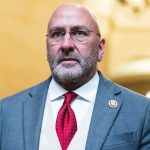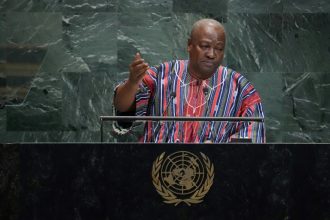“The first rule of holes is to stop digging,” Larry Summers said a few months ago in an interview with the New York Times about why, in his opinion, the Trump administration should stop levying tariffs on foreign countries.
Summers should have taken his own advice: He only stopped digging the hole in which he currently resides when he sent his last email to the late convicted sex offender Jeffrey Epstein on July 5, 2019 — the day before Epstein was arrested for the last time.
Now, in the wake of revelations about his extended correspondence with Epstein for over a decade after Epstein had already been sent to jail for soliciting a minor for prostitution, Summers has announced that he will be retreating from public commitments — at least those where he would presumably be asked about Epstein.
Summers did say that he will continue teaching at Harvard, where he holds the title of “University Professor,” the highest stature that Harvard can award a member of its faculty — among the roughly 900 tenured faculty members on Harvard’s Faculty of Arts and Sciences, there are only 24 University Professors. That number may soon be 23. Elizabeth Warren, a Harvard Law School professor before her election to the U.S. Senate, has already called for the university to dump Summers. Students, alumni and donors will surely pile on. And, while there’s never a good time to have a convicted sex offender pen pal on your payroll, it’s a particularly inopportune moment for Harvard to host such a glaring liability amid scrutiny from President Donald Trump.
Summers now faces the prospect of an inglorious end to a career that has had high highs and low lows across decades in public life. Even for someone as resilient as Summers, it will be difficult for him to craft one last next act. And considering how many in Washington, Cambridge and beyond he antagonized with his infamous arrogance, there are many cheering his fall.
In his youth, Summers showed almost unparalleled promise. He was an intellectual prodigy; at the age of 7, he could recite the names of John F. Kennedy’s Cabinet members. He appeared on a sports radio quiz show and answered everything so quickly the station ran out of questions.
Young Larry was, frankly, expected to be brilliant. His parents were economics professors at the University of Pennsylvania. Two of his uncles, Paul Samuelson and Ken Arrow, were among the greatest minds in 20th century economics. (Robert Summers, Larry’s father, reportedly changed his name to Summers from Samuelson for fear of antisemitism in academia.) Both Samuelson and Arrow won Nobel Prizes for their work. It seemed entirely plausible that Summers would do the same. After college at MIT and graduate school at Harvard, where he studied under renowned conservative economist Martin Feldstein, Summers became, at age 28, one of the youngest tenured professors in Harvard’s history. In 1993 he won the John Bates Clark medal, given by the American Economic Association to the country’s outstanding economist under age 40. The award is widely considered predictive of a Nobel.
As it turned out, Summers would never achieve the type of intellectual breakthroughs that his uncles had. Perhaps he was too attracted to — too distracted by — the more muscular life of political power and influence that he first experienced in 1981, when he went to Washington to work with Feldstein, Ronald Reagan’s chair of the White House Council of Economic Advisers. The year after winning the Clark medal, Summers headed to the capital again to work at the World Bank, then joined Lloyd Bentsen’s Treasury Department in the new Clinton administration.
Because Harvard requires professors to resign if they spend more than two years away from the university, Summers, one of the youngest professors ever to win tenure, became one of the youngest professors ever to give it up. Some of his colleagues interpreted the move as a sign that Summers was more interested in being a D.C. powerbroker and popular intellectual than a heavyweight economist.
If so, Summers made the right choice. He would become Robert Rubin’s deputy when Rubin took over from Bentsen in 1995. Their work together on the international debt crises of the 1990s made Summers famous; in February 1999, TIME magazine put him, Rubin and Fed chair Alan Greenspan on its cover, with the headline “The Committee to Save the World.” A few months later, Summers succeeded Rubin as Treasury Secretary, serving until the end of the Clinton presidency. In 2001, upon the retirement of outgoing Neil Rudenstine, Harvard University chose Summers as its next president.
On paper, it was a logical move — Summers was a figure of international renown — but it worried some of those who knew Summers. The economist had earned a reputation as a bull in a china shop, rudely dismissive of the opinions of others, astoundingly arrogant even by Washington standards. He was respected for the power and precision of his mind but never, ever thought of as diplomatic, a trait typically thought valuable in a university president.
Both qualities marked Summers’ historically brief tenure in the job. Some critics of higher education in general and Harvard specifically liked that the university had a new and impolitic boss. Over five years, he would win the hearts of some social conservatives who reveled in his attacks on “woke” faculty, allegedly politically correct students and the appearance of antisemitism on campus. But his ill-concealed disdain for much of the faculty, some Harvard students and deeply held traditions of academic freedom threw the university into turmoil. He would hate the comparison, but there was something both pre- and proto-Trumpian about Summers.
Philosopher Michael Sandel, one of the Harvard’s most popular professors, called Summers an “intellectual imperialist,” which, again, some people found appalling and some thought was the harsh medicine Harvard needed. But most of the latter group did not work for Harvard, and after a speech in which Summers seemed to suggest that women had a genetic inferiority in math and science relative to men, he resigned under pressure in February 2006. To cushion the pain of the fall — and minimize the fallout — Harvard awarded Summers the Charles W. Eliot University Professorship, named after the university’s longest-serving and perhaps greatest president.
His reemergence took time, but Summers eventually clawed his way out of the hole he had dug for himself and back into the good graces of his party and the media. Journalists appreciated his carefully honed skill for delivering snappy quotes. Democrats didn’t always love his opinions — he lambasted Joe Biden’s $1.9 trillion American Rescue Plan as inflationary — but he was largely seen as prophetic when prices stayed stubbornly high. And when he did criticize Republicans or support Democratic positions, his words carried weight. No one questioned his intelligence.
Until now, anyway. The question many would like to ask the former Treasury secretary and former president of Harvard is the same that Jay Leno once asked Hugh Grant after the actor’s arrest for solicitation of a prostitute: What the hell were you thinking?
It’s not just that Summers continued a friendship with a man who clearly had a pathological sexual interest in girls and had gone to jail for his sexual proclivities. It is also hard to imagine how Summers could have been so stupid as not to expect that emails with a convicted felon might one day go public.
As for the content of the emails… much of it is, in a word, gross. Certainly, we all write emails that, deprived of context, could embarrass us if they went public. But Summers’ emails went to a deeper, darker place; there is no context that absolves them. An ongoing theme is his recurring need for fraternal support from Epstein, repeatedly asking for advice on how to prolong an affair with a younger woman who was not his wife. In one exchange, Epstein called himself Summers’ “wing man.” The two men referred to the object of Summers’ lust — reported by the Harvard Crimson to be a Chinese economist — as “peril,” apparently short for “yellow peril,” the racist canard dating to Western imperialism of the late 19th century. When the clandestine relationship appeared to be fizzling out, Summers lamented that he “dint [sic] want to be in a gift giving competition while being the friend without benefits.” That sounds disturbingly like a sexual quid pro quo. In November 2018 Summers wrote, “I think for now I’m going nowhere with her except economics mentor,” which is the kind of relationship that should make Harvard think twice about Larry Summers, teacher.
The contrast between Summers’ globe-spanning influence and his tawdry moral failings is hard to explain. It may reflect some toxic combination of his innate desires to be more than he is; his sense of entitlement combusting with his simmering resentments against those he sees as privileged insiders and social elitists; a lingering bitterness over the Harvard that would not accept him; his egotism and a sense that the rules don’t apply to him; the hunger of a nerdy kid to be part of the anything-goes bro-culture that, to some wealthy but inadequate men, Epstein seemed to embody.
Consider this lesser-known Larry Summers story. In July 2011, the former Harvard president was interviewed at the Aspen Institute by its head, author Walter Isaacson, in front of an admiring group. A friendly Isaacson asked about the veracity of a scene in the movie The Social Network in which Summers agrees to meet with Cameron and Tyler Winklevoss, two Harvard undergraduates who claimed that Mark Zuckerberg had stolen the idea for Facebook from them. The “Winklevi,” as Summers referred to them, came from Greenwich, Conn., rowed crew, were tall, handsome and old school — they wore coats and ties to meet the Harvard president. Summers disliked them instinctively, and the film portrays him treating them with humiliating condescension. Was it true? Isaacson wanted to know.
“One of the things you learn as a college president is that if an undergraduate is wearing a tie and jacket on Thursday afternoon at three o’clock, there are two possibilities,” Summers answered. “One is that they are looking for a job and have an interview. The other is that they are an asshole. This was the latter case.”
The remark — a former president of Harvard describing two of its students as assholes — prompted near-unanimous laughter from the audience, titillated by this trash-talking rule-breaker. Summers wore the chuffed look of a man who rarely tells a successful joke but is pleased to have done so now. The funny thing is that Summers was wrong on both counts: Zuckerberg wound up paying a $65 million settlement to the Winklevoss twins, and Larry Summers turned out to be the asshole.









